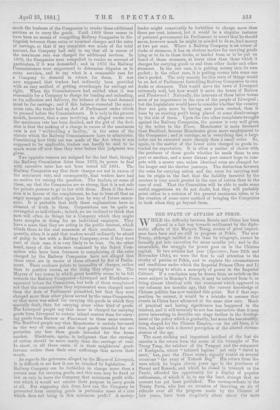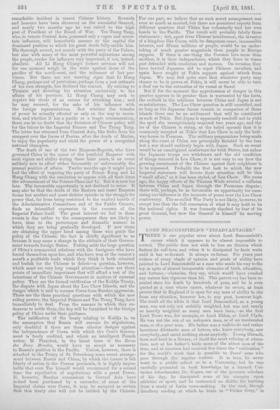TIIE STATE OF AFFAIRS AT PEKIN.
WHILE the difficulty between Russia and China has been placed in a fair way towards settlement by the diplo- matic efforts of the Marquis Tseng, events of great import, arm have been and are still in progress at Pekin. The new Treaty, although ratified at the time by telegraph, cannot be formally put into execution for some months yet ; and in the meanwhile, the struggle for power goes on in the Chinese capital. In two articles last year (Spectator, June 26th and November 13th), we were the first to call attention to the rivalry of parties at Pekin, and to explain the circumstances and conditions under which the Imperial Princes Chun and Li were aspiring to attain a monopoly of power in the Imperial Cabinet. If a conclusion may be drawn from an article on the same subject in Monday's Times, it may be inferred from it, as being almost identical with the statement which appeared in our columns ten months ago, that the current knowledge of Chinese politics has now reached this point. But if that sup- position be correct, it would be a mistake to assume that events in China have advanced at the same slow rate. Much of practical and lasting significance has happened in the interval, and it will certainly be not less instructive than it may prove interesting to describe one stage farther in the develop- ment of the policy which is gradually, but none the less steadily, being shaped for the Chinese Empire,—on the old lines, it is true, but also with a shrewd perception of the altered circum- stances of the age. The most striking and important incident of the last six months is the return from the scene of his triumphs of Tao Tsung Tang, the subduer of the Tungani and the conqueror of Kashgaria, whose " tattered legions" not only " dared to meet," but, Pace the Times writer, signally routed on several occasions "the army of Yakoob Beg." His return from the wars which he began eleven years ago in the provinces of Shensi and Kansuh, and which he closed in triumph on the Pamir, afforded the opportunity for a display of popular enthusiasm, of which it is, to say the least, strange that no account has yet been published. The correspondents in the Treaty Ports, who lose no occasion of throwing an air of ridicule over all the progress made by the Chinese of late years, have been singularly silent about the most
remarkable incident in recent Chinese history. Rewards and honours have been showered on the successful General, and nearly two months ago he was raised to the high post of President of the Board of War. Tso Tsung Tang, who, in remote Central Asia, possessed only a vague and uncer- tain influence, will henceforth assume at the capital the dominant position to which his great deeds fully entitle him. His thorough accord, not merely with the party of the Palace, but also with many of the most powerful aspirations among the people, render his influence very important, if not, indeed, absolute. All Li Hung Chang's former services will not for one moment weigh in the scale against those of the pacifier of the north-west, and the redeemer of lost pro- vinces. But there are not wanting signs that Li Hung Chang, perhaps out of patriotism, perhaps from a just estimate of his own strength, has declined the contest. By retiring to Tientsin and devoting his attention exclusively to the affairs of his province, Li Hung Chang may seek to deprive his rivals of an excuse for attacking him ; and he may succeed, for the sake of his influence with the foreign representatives. But whether the transfer of power be actually effected or only on the way to execu- tion, and whether it has a pacific or a tragic consummation, there can be no doubt that the dictators of Chinese policy will for the future be the Imperial Princes and Tso Tsung Tang. The latter has returned from Central Asia, like Sulks from his conquest over the forces of Pontus, after the death of Marius, to enjoy the popularity and wield the power of a recognised national champion.
The death of one of the two Empress-Regents, who have governed China in the name of the youthful Emperor with such vigour and ability during these later years, is an event unlikely now to affect either favourably Or unfavourably the present position of affairs. Twelve months ago it might have had the effect of inspiring the party of Prince Kung and Li Hung Chang with the resolution to oppose with all their force the advancement of the Princes Chun and Li. Bet it is now too late. The favourable opportunity is not destined to recur. It may also be that the death of the Eastern and lesser Empress forms but another and more sinister episode in the struggle for power that, far from being restricted to the exalted boards of the Administrative Committees and of the Public Censors, finds an intensified expression in the recesses of the Imperial Palace itself. The great interest we feel in these events is due rather to the consequences they are likely to have, than to the picturesque and dramatic manner in which they are being gradually developed. If new views are obtaining the upper hand among those who guide the policy of the Chinese, the fact is chiefly significant to us because it may mean a change in the attitude of their Govern- ment towards foreign States. Putting aside the large question of China's commercial relations with the foreigners who have forced themselves upon her, and who have won at the cannon's mouth a profitable trade which they think it both criminal and foolish for the Chinese to detest—a question, however, which must ere very long compel attention—there are three points of immediate importance that will afford a teat of the intentions of the Chinese Government in matters of external policy. They are the formal ratification of the Kulcija Treaty, the dispute with Japan about the Loo Chow Islands, and the danger which is said to menace Corea from Russian aggression. These are the three practical questions with which the new ruling powers, the Imperial Princes and Tso Tsung Tang, have immediately to deal. From the manner in which they en- deavour to settle them, the key will be furnished to the foreign policy of China under their guidance. The ratification of the treaty relating to Kuldja is, on the assumption that Russia will execute its stipulations, only doubtful if there are those ulterior designs against the independence of Corea with which the Czar's Govern- ment is freely credited, and which an intelligent French writer, M. Plauehut, in the latest issue of the Revue des Deux 2Ifondes, would have us accept as necessary to Russia's position in the Pacific. Unless, however, there is attached to the Treaty of St. Petersburg some secret arrange- ment between Russia and China, by which the former is left liberty of action in the Corean peninsula, it is highly impro- bable that even Tso himself would recommend for a second time the repudiation of negotiations with a great Power. If, however, Russian concessions in Central Asia have indeed been purchased by a surrender, of some of the Imperial claims over Corea, it may be accepted as certain that this treaty also will not be ratified by the Chinese. For our part, we believe that no such secret arrangement was even so much as mooted, but there are persistent reports from different quarters that China has voluntarily tied her own hands in the Pacific. The result will probably falsify these statements ; but, apart from Chinese interference, the invasion of a kingdom like Corea, with its dangerous coast, inaccessible interior, and fifteen millions of people, would be an under- taking of much greater magnitude than people in Europe suppose. If there is one thing the °mans love more than another, it is their independence, which they have in times past defended with resolution and success. On occasion they have invited Japanese aid to repel Chinese invaders, and again have sought at Pekin support against attack from Japan. We may feel quite sure that whatever party may chance to be in power-at Pekin, it will never be able to turn a deaf ear to the entreaties of its vassal at Seoul.
But if for the moment the apprehension of danger in this quarter appears to be greater than is warranted by the facts, the outlook in the relations between China and Japan is not so satisfactory. The Loo Chow question is still unsettled, and so long as the Japanese forces remain in occupation of those islands there can be no settlement that will be considered as such at Pekin. But Japan is apparently resolved not to yield the spoil she surreptitiously acquired two years ago, and the ire of the Chinese is rising, as the belief spreads that it is commonly accepted at Tokio that Loo Chow is only the half- way house to Formosa. The military preparations being made along the coast of China are principally dictated by the fear lest a war should suddenly begin with Japan. Such an event would be an unmitigated misfortune for both States, but unless the Japanese troops are withdrawn and the old condition of things restored in Loo Chow, it is not easy to see how the growing resentment of the Chinese against their neighbour is to be repressed. Probably the first task to which the new Imperial statesmen will devote their attention will be this "small affair," as it has been styled, of Leo Chow. Six years ago, the happy efforts of Sir Thomas Wade averted a collision between China and Japan through the Formosan dispute ; there will, perhaps, be as favourable an opportunity for exer- cising our influence in the interests of peace over the Loo Chow controversy. The so-called War Party is not likely, however, to accept less than the full conceseion of what it may hold to be the national rights. It was formerly checked by fear of its great General, but now the General is himself its moving power.



































 Previous page
Previous page